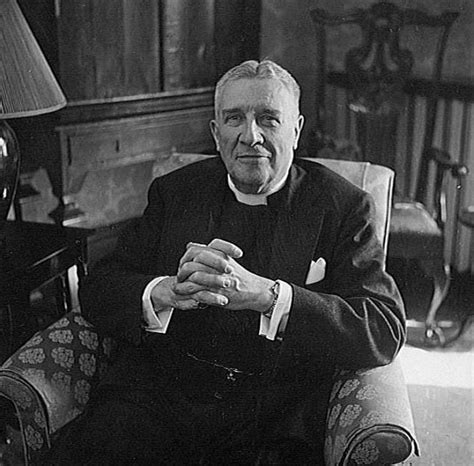A Quote by Johannes Tauler
Is it not shameful and a great scandal that we poor latecomers, we Christians, aided by grace, the Faith, and the sacraments, should be running about like blind hens, ignorant of our own self and of the depth within us?
Related Quotes
This is the amazing story of God’s grace. God saves us by His grace and transforms us more and more into the likeness of His Son by His grace. In all our trials and afflictions, He sustains and strengthens us by His grace. He calls us by grace to perform our own unique function within the Body of Christ. Then, again by grace, He gives to each of us the spiritual gifts necessary to fulfill our calling. As we serve Him, He makes that service acceptable to Himself by grace, and then rewards us a hundredfold by grace.
There are a lot of voices inside of us. We have the voices of our parents, our grandparents, our society, our bosses, our own should's and shouldn'ts, and our self-worth is in us, controlling us a lot. When we can get past all of those, and get to the deep, core part of us, there's a voice within our soul that I believe is connected to our Divine or Higher Self. That voice within is there to guide us through all aspects of our lives.
The Prayer of Examine produces within us the priceless grace of self-knowledge. I wish I could adequately explain to you how great a grace this truly is. Unfortunately, contemporary men and women simply do not value self-knowledge in the same way that all preceding generations have. For us technocratic knowledge reigns supreme. Even when we pursue self-knowledge, we all too often reduce it to a hedonistic search for personal peace and prosperity. How poor we are! Even the pagan philosophers were wiser than this generation. They knew that an unexamined life was not worth living.
But, today, the idea of faith returns to me. Faith defies logic and propels us beyond hope because it is not attached to our desires. Faith is the centerpiece of a connected life. It allows us to live by the grace of invisible strands. It is a belief in a wisdom superior to our own. Faith becomes a teacher in the absence of fact.
Some of us have a hard time believing that we are actually able to face our own pain. We have convinced ourselves that our pain is too deep, too frightening, something to avoid at all costs. Yet if we finally allow ourselves to feel the depth of that sadness and gently let it break our hearts, we may come to feel a great freedom, a genuine sense of release and peace, because we have finally stopped running away from ourselves and from the pain that lives within us.
Faith is not our saviour. It was not faith that was born at Bethlehem and died on Golgotha for us. It was not faith that loved us, and gave itself for us; that bore our sins in its own body on the tree; that died and rose again for our sins. Faith is one thing, the Saviour is another. Faith is one thing, and the cross is another. Let us not confound them, nor ascribe to a poor, imperfect act of man, that which belongs exclusively to the Son of the Living God.
Faith takes us to deep places, to the ruptures in our self-confidence and our lives. Do not settle for spiritual comfort all the time...Darkness is divine also. Faith is not about positive thinking so much as about what kicks in when we are weak, sick, and short of self-confidence. The via positiva never stands alone. The via negativa is always with us on our faith journey as well.
It is grace at the beginning, and grace at the end. So that when you and I come to lie upon our death beds, the one thing that should comfort and help and strengthen us there is the thing that helped us in the beginning. Not what we have been, not what we have done, but the Grace of God in Jesus Christ our Lord. The Christian life starts with grace, it must continue with grace, it ends with grace. Grace wondrous grace. By the grace of God I am what I am. Yet not I, but the Grace of God which was with me.
I think the Bhagavad Gita is about both the forces of light and the forces of darkness that exist within our own self, within our own soul; that our deepest nature is one of ambiguity. We have evolutionary forces there - forces of creativity, and love, and compassion, and understanding. But we also have darkness inside us - the diabolical forces of separation, fear and delusion. And in most of our lives, there is a battle going on within ourselves.
There is another important point: encountering the poor. If we step outside ourselves we find poverty. Today-it sickens the heart to say so-the discovery of a tramp who has died of the cold is not news. Today what counts as news is, maybe, a scandal. A scandal: ah, that is news! Today, the thought that a great many children do not have food to eat is not news. This is serious, this is serious! We cannot put up with this! Yet that is how things are. We cannot become starched Christians, those over-educated Christians who speak of theological matters as they calmly sip their tea.
Perhaps the most difficult task for us to perform is to rely on God’s grace and God’s grace alone for our celebration. It is difficult for our pride to rest on grace. Grace is for other people—for beggars. We don’t want to live by a heavenly welfare system. We want to earn our own way and atone for our own sins. We like to think that we will go to heaven because we deserve to be there.
Let us face at the outset how many Christians are not victorious, but defeated. Defeated by circumstances, defeated by other peoples? natures and wrong-doings, defeated by the down-drag of the flesh, defeated by loss, by pain, by suffering, by worry. Instead of saying with confidence, ?This is the victory that overcometh the world, even our faith?, they have to say in honesty, ?This is the defeat that has been caused by the world, even our self-centeredness.? That is the opposite of faith. Unbelief is not the opposite of faith; self-centeredness is ? being centered in self rather than in God.





































